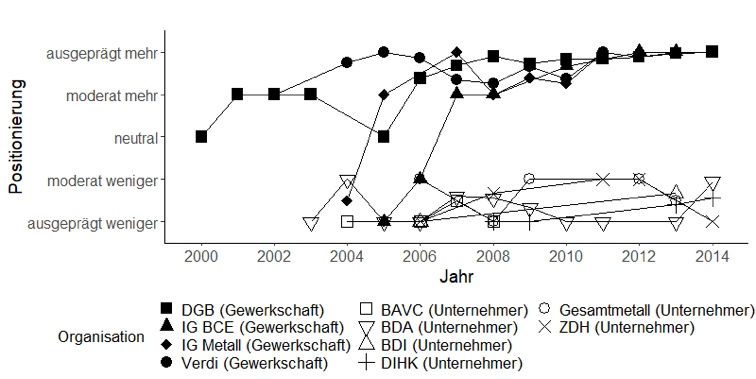– September 2022
 |
| Positionen zum Mindestlohn; Quelle: Bender, Benedikt (2020): Politisch-ökonomische Konfliktlinien im sich wandelnden Wohlfahrtsstaat. Positionierung deutscher Interessenverbände von 2000 bis 2014. Wiesbaden: Springer-VS, Seite 242. |
The focus of the data set "Reform Monitor of Political Conflicts" (ReMoPo) created by Dr. Benedikt Bender is the question of changing political lines of conflict of organized interests. What are the positions of employers' associations, trade unions and political parties on labor market, social and family policy? How do they position themselves on protection against dismissal, fixed-term employment, unemployment benefits, minimum wages, KITA infrastructure or parental benefits? Can changes over time and/or variations within the organizations be shown, and how much do the positions on political parties differ? Do the organizations change their positions in times of crisis, such as the economic and financial crisis or the Corona pandemic?
To answer these questions empirically, press releases are analyzed and expert interviews are conducted. The ReMoPo dataset starts in 2000 and currently includes seven employers' associations, six trade unions and seven political parties. The dataset is used by Dr. Bender and his team in teaching and research, as well as by our students for term papers and theses.
In summary, from the analyses to date, support for welfare state policies varies by issue and can change as contexts change. For example, it cannot be shown that employer organizations generally oppose welfare state expansion, just as unions do not necessarily support expansion. Purely ideological factors of organizational types per se (labor/capital; left/right) are therefore not sufficient factors to explain positions. Rather, they are pragmatic explanatory factors, such as the extent to which affiliates, or their members, benefit from the reforms.
In perspective, the data set will be extended in two directions: On the one hand, the positions of the Acutere are to be analyzed in an EU country comparison, and on the other hand, a focus is also to be placed on the German federal states.
- Studying at Goethe University
- International applicants
- Faculties
- Overview of study programmes
- Programme for refugees
- GRADE
- Goethe Business School (continuing education)
- Research at Goethe University
- Scientific news
- Goethe Welcome Center (for international researchers)
- Collaborative research projects
- Individual research
- Visiting fellowships
- Endowed chairs
- About the University
- News-in-brief
- University administration
- Campus locations
- Campus life
- University archives (German)
- Rhine-Main-Universities






